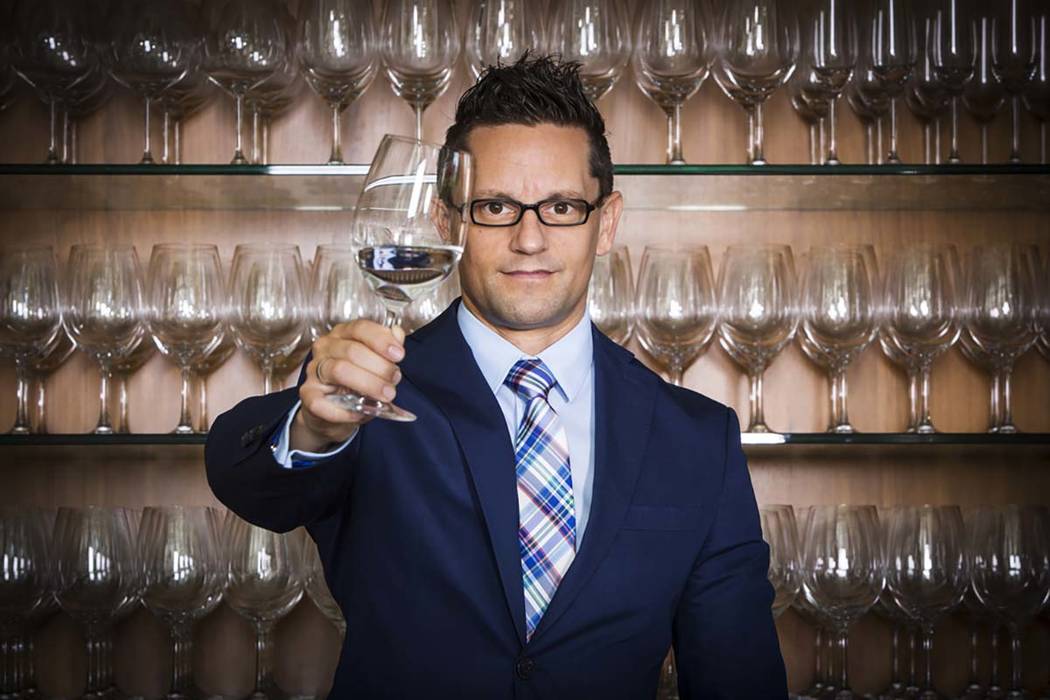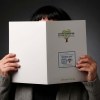Las Vegas restaurants filtering tap water for environment, quality

Sparkling or still?
If you’re asked that in a Las Vegas restaurant and expect to answer with a request for your favorite brand of bottled water, you may be disappointed. Because of increased awareness of the burden of those bottles on the environment, more and more places are filtering their H2O and serving it in reusable glass vessels.
Aaron Pannell, general manager of Bouchon at The Venetian, said Thomas Keller’s restaurants serve only water processed through a Nordaq Fresh system, starting more than 10 years ago at The French Laundry in Yountville, California. Pannell said the system removes from tap water the chlorine and other elements that adversely affect the flavor. But to avoid a flat, “stripped” quality, it leaves minerals that contribute to the taste.
“It’s very quenching,” Pannell said. “But it’s not an overpowering flavor that you’re going to remember.”
It’s $7 per carafe for guests.
Like most other systems, Pannell said the Nordaq makes sparkling water as well as still.
“It’s a very fine sparkling,” he said. “It still has that flavor of a mineral water, like a Perrier, an Aqua Panna. But at the same time the effervescents are very fine. Those fine bubbles are just like a good Champagne — the finer the bubbles, the better the flavor overall.”
He said the only commercial bottled water they sell is at the pool bar in the summer, because glass and pools aren’t compatible.
“On a regular basis we actually get requests for water to go,” Pannell said. “That’s kind of a neat thing.” In those cases, they ask people to bring in their own containers.
Rich Wolf, founder of the Tao Group, which has Tao at The Venetian, Lavo at Palazzo and Beauty & Essex at The Cosmopolitan of Las Vegas, said the way water tastes affects a restaurant not just in the glass, but in things like ice cubes, espresso and soups. Wolf said the group’s water is filtered as it enters the restaurants, and again in equipment such as ice machines and espresso machines.
They serve only the Vivreau water, which they filter and bottle in glass, in the restaurants. Last year they sold 50,000 bottles at the three Las Vegas spots, keeping that many from entering the waste stream.
B&B Hospitality Group’s Las Vegas restaurants (B&B Ristorante at The Venetian, Otto Enoteca Pizzeria in the Grand Canal Shoppes and Carnevino at Palazzo) use a Vero reverse-osmosis system that filters the water five times and uses glass reusable bottles, said Nicole Brisson, culinary director. They also serve water only on request.
“It was all part of the green initiative initially,” Brisson said. “The system worked out so well — the clarity, the cleanness, the crispness, the subtle minerality. It’s water that makes me feel good about serving it in the restaurant without being wasteful, especially in an environment like Vegas, where we tend to be pretty wasteful.”
Sean Roe, culinary director of Emeril Lagasse’s three Las Vegas restaurants (Emeril’s New Orleans Fish House at MGM Grand, Delmonico Steakhouse at The Venetian and Lagasse’s Stadium at Palazzo), said they use a filtration system for table water, ice and coffee, and because Las Vegas’ hard water is rough on kitchen equipment. But they don’t use filtered water in cooking.
“We have enough confidence in the public water system that we don’t have to do that,” he said.
They do sell bottled water.
“Mostly, that’s market-driven,” Roe said. “We’ve had a couple of filter systems where you get the bottles and you fill them yourself and try to get people to drink those and it just hasn’t worked out for us. We’re always looking at ways to provide the best drinking water for our guests and hopefully reduce the amount of bottled water they would want, because they’re happy with the choice they have.”
At Pizza Rock on North Third Street downtown, chef/owner Tony Gemignani uses water processed through a reverse-osmosis system for his dough.
“It’s not the flavor,” he said. “The properties of yeast and how your dough rises and stretches, elasticity, it actually helps with all of that. You can really damage the structure of your dough if you’re using bad water.”
Gemignani said he uses a reverse-osmosis system in every store he has except San Francisco. But he also sells bottled water because a system that could handle the volume needed for cooking and drinking isn’t practical, he said.
Tao Group sells its water for $8 a bottle and donates 10 percent of the proceeds to Whole World Water, which redistributes it to established water charities. Wolf said so far, the group has donated a half-million dollars.
He said the system and the charitable initiative are particularly important to employees.
“People in their 20s and 30s are highly motivated in saving the environment,” he said. “It makes them proud.”
And for good reason.
“It’s vital,” Roe said of water. “There’s hardly anything more important.”
Water is life, and lately it seems to occupy more of our lives, not to mention our budget. At Patina restaurant at The Walt Disney Concert Hall in Los Angeles, a 0.75-liter bottle of Svalbardi water from Norway is $150.
“Because it’s very, very hard to get this water,” said Martin Riese. “This water is nothing but diluted icebergs.”
Riese is Patina’s general manager and water sommelier, overseeing a menu of 26 mineral waters. And yes, he can see you rolling your eyes. Riese said he encounters three types of customers: Those who say, “That’s the stupidest thing,” those who say, “that’s crazy, but they’re intrigued. And people who know we have a water menu and come specifically.”
And he’s trying hard to overcome the skepticism.
“In the restaurant business, it’s all about options,” he said. “Water is the most important beverage in our life. We don’t even tell them what we’re serving — like if you go to a bar and ask for a beer and they give you a Coors Light. But water, we just say, ‘Yeah, whatever.’ I want to change that.”
Plus, he said, there are many people who don’t drink alcohol: “We feel equal now, in your restaurant, because we can still get a menu,” he’s been told.
Riese said he first noticed the different properties of water as a child traveling with his parents to various European cities. He started thinking about it in 2005, when a customer at a restaurant he was managing in Germany said, “You have all these wines, but only one type of water.”
And, depending on their properties, waters can be paired with food just like wine — or even with beverages, including wine. Riese said Vichy Catalan from Spain has more electrolytes (naturally occurring) than Gatorade. Because of that, “it’s very salty, very intense flavors. It’s a cool water for barbecuing. With a steak, it’s super-nice.”
The widely available Fiji, he said, has a lot of silica in it; “that’s a mineral that makes water extremely smooth. Pair this water with a red wine and the tannins will suddenly be more smoothed out, with more complexity coming out of the red wine.”
He scoffs at the notion of water washing everything away.
“I know this sounds crazy, but water should not clean your palate,” Riese said. “I want to find a water that pairs so perfectly that I still have the sensation of the wine on my palate, even when I’m drinking water. Those are flavors I just paid a lot of money for.”
Riese was certified as a water sommelier by the German Water Trade Association in 2010, the year before he came to the United States. He said there are “hundreds” of water sommeliers in Germany, but only two or three in this country. There are two schools in Germany, one in Italy, one in South Korea and one in China. Riese is launching an online program, so “everybody can be a water sommelier.”
While he supports naturally occurring spring or glacier water — mineral water — he rails against bottled purified water, especially those from municipal water sources.
“For me, that’s the biggest scam on earth,” Riese said. “When you want to drink tap, drink tap,” and he has a filtration system at his restaurant so guests can do just that. But he does see the tide of water turning.
“I think the fun thing,” he said, “is last year, bottled water was the No. 1 consumed beverage by Americans.”
Correction: A previous version of this story misidentified the cost for Nordaq Fresh water.
Contact Heidi Knapp Rinella at Hrinella@reviewjournal.com or 702-383-0474. Follow @HKRinella on Twitter.













